What is even more saddening is that he had such a difficult and torturous battle with cancer. However, this pine-like man successfully passed the coldest winter of his life with courage and determination, and ushered in a warm and brilliant “second life”.
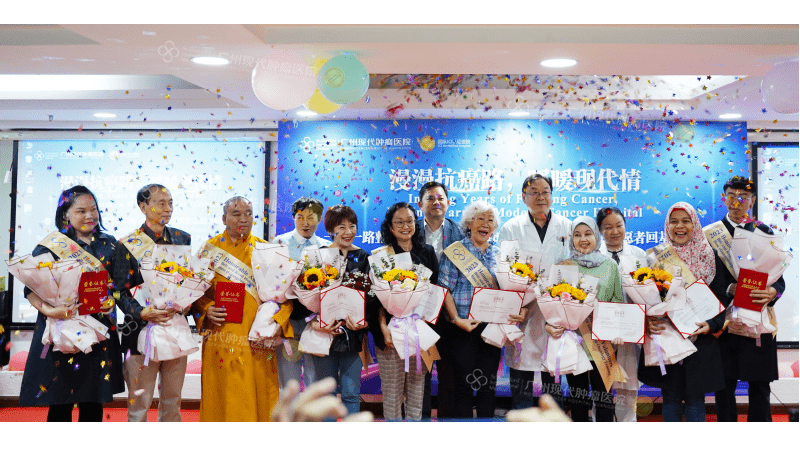
Group Photo of Anti-Cancer Star Volunteer
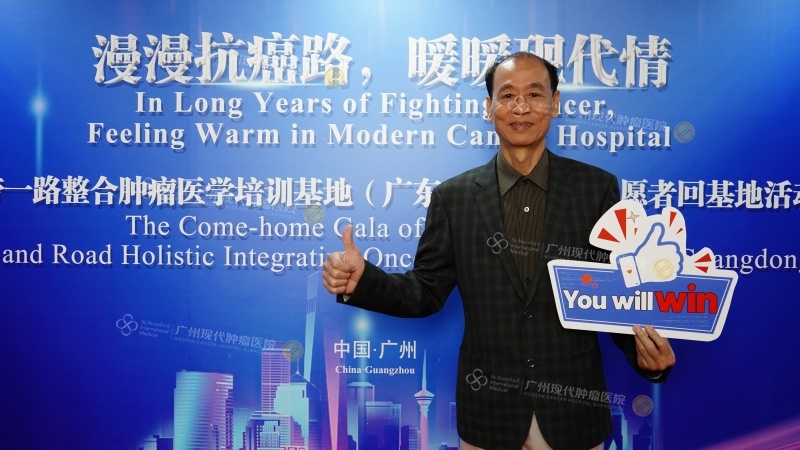
Mr. Nguyen Thanh Tung at the event
Diagnosed with stomach cancer, surgery and chemotherapy left him skinny
Nguyen Thanh Tung, a doctor, maintains a healthy diet and lifestyle, even at his age, his body is still relatively strong. After retiring, he began to enjoy the leisurely life of “slowing down”.
However, in November 2016, he began to experience bloating and pain in his upper abdomen, especially after meals. “At first, I thought it was just a common stomach upset or gastritis and didn't pay much attention to it, just taking stomach pills to relieve it, but the symptoms didn't go away with time.” He recalled.
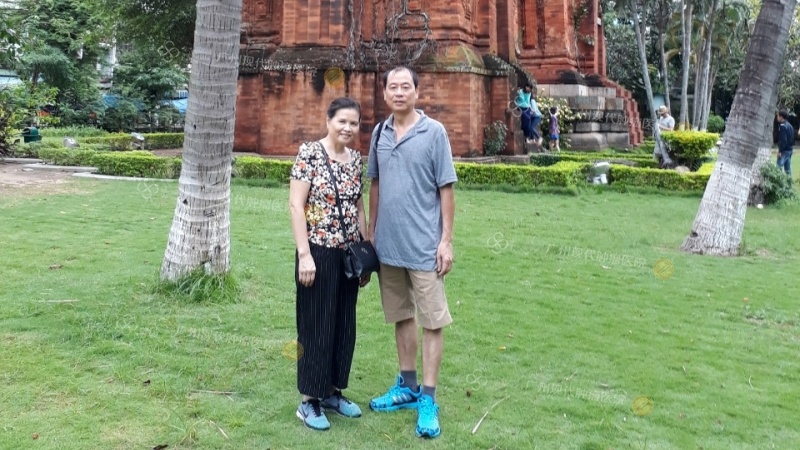
Life photo of Mr. Nguyen Thanh Tung
In March 2017, Nguyen Thanh Tung underwent a gastroscopy at a local hospital in Hanoi, and the results brought him and his family hit rock bottom: it showed that he had stage III stomach cancer with lymph node metastasis. Doctors advised him to undergo a gastrectomy, and he was internally in a state of shock, worrying about the risks after the operation, but he mustered the courage to lie down on the operating table just ten days later in order to fight the cancer.
After the operation, three-quarters of his stomach was removed, leaving a scar of about 10 cm on his body, accompanied by physical pain as well as the chemotherapy process. Subsequently, he continued to experience adverse reactions such as nausea and vomiting, loss of appetite, and weakness. "Three months after the operation, my weight dropped sharply by dozens of pounds, and my whole body was unable to eat, weak, and thin as a 'paper'. Family members see me like this, both heartbroken and anxious ...... "Remembering that most torturous time, his eyes began to flood with tears.
As a doctor, he realized that his already frail body would not be able to withstand it if he continued with traditional chemotherapy. In order to find better treatment options, the family searched on the internet for the latest anti-cancer technology and found St. Stamford Modern Cancer Hospital Guangzhou, which gave them hope when they learned that the hospital specializes in minimally invasive anti-cancer technology and has an office in Hanoi.
Interventional therapy saved his weakened body
Nguyen Thanh Tung and his family arrived at our Hanoi office for a consultation and were received by Prof. Le Van Cao and the office manager. After learning about his disease history, Prof. Le Van Cao offered a series of professional treatment suggestions for his condition and also encouraged him to be brave enough to overcome cancer.
He then discussed with his family about the treatment in China, and they all agreed that minimally invasive treatment is more suitable for his physical condition, and learned that the hospital has Vietnamese interpreters, so they don't need to worry about the language barrier, so they decided to came to Guangzhou for treatment. After help and guidance from the Hanoi office, in July 2017, Nguyen Thanh Tung came to St. Stamford Modern Cancer Hospital Guangzhou. The hospital’s MDT medical team formulated an interventional treatment plan for him based on his condition.
"At first I didn't know how the interventional treatment was performed; the technology was not available in Vietnamese hospitals and I was curious and a bit apprehensive about it. But when the doctors in the interventional department were treating me, fortunately, there were interpreters next to me, translating and treating me at the same time, which eased my uneasiness." Remembering the treatment process, Nguyen Thanh Tung was impressed by the scene as if it were yesterday.
Interventional therapy only opens a 1-2 mm incision will be a special catheter or guide wire directly into the body, the tumor area for drug perfusion and embolization of the tumor blood arteries, and the local drug concentration is 2-8 times higher than the traditional chemotherapy so that the tumor loses the blood supply and thus "starve to death".
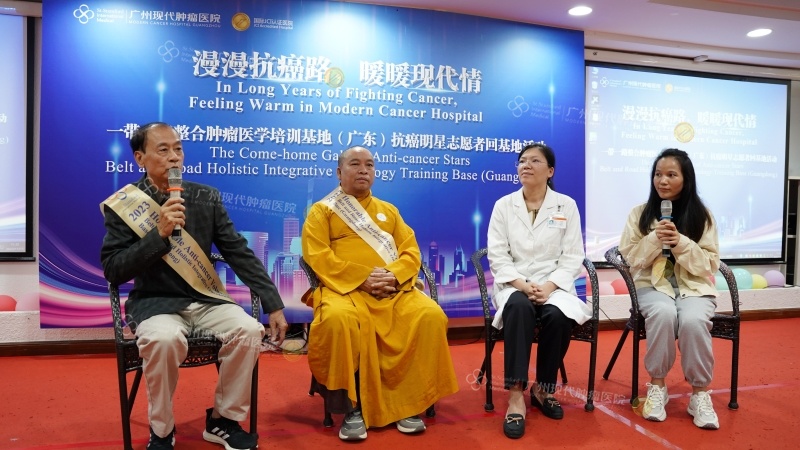
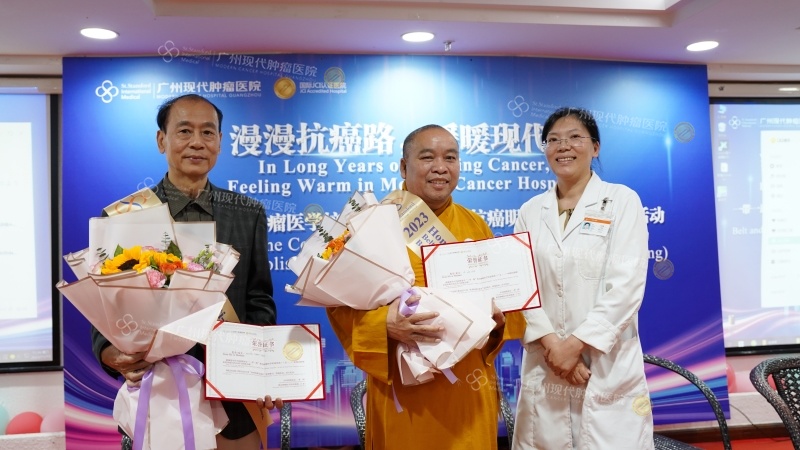
Vietnamese cancer stars Nguyen Thanh Tung and Vo Van Hoa with attending physician Dr. Ma
As recalled by his former attending physician, Director Ma, he received a total of five interventional treatments at our hospital, and the follow-up medical examinations showed that his tumor was under control and his condition had stabilized. His family said, "With each treatment, we watched as his appetite became better, he resumed his normal diet, and his weight went up."
This change also surprised the staff of our Hanoi office, who recalled, "When Mr. Nguyen first came to the office to inquire about treatment abroad, he was particularly weak, and even walked trembling, but after completing the treatment the whole person was completely different and recovered like a normal person."
Recovering health
To a better "second life."
Now, Nguyen Thanh Tung has successfully fought cancer and recovered his health for nearly seven years, accompanying his family and living a peaceful and fulfilling life. In the interview, looking back, he expressed his gratitude to the hospital most.
"I am very grateful to the hospital's MDTs and nurses, such as Director Ma and Director Peng, who treated me to the best of their ability clinically and provided a lot of guidance advice on diet and exercise, and it is all thanks to them and the hospital's superior minimally invasive anticancer technology that I am now able to recover so well." He said sincerely.
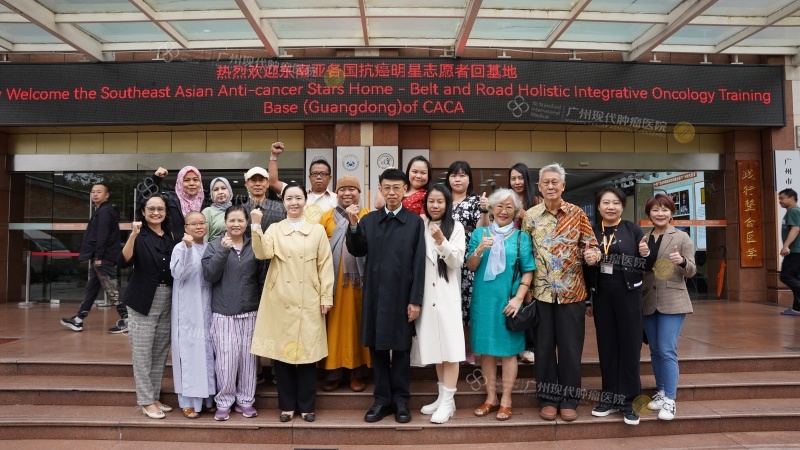
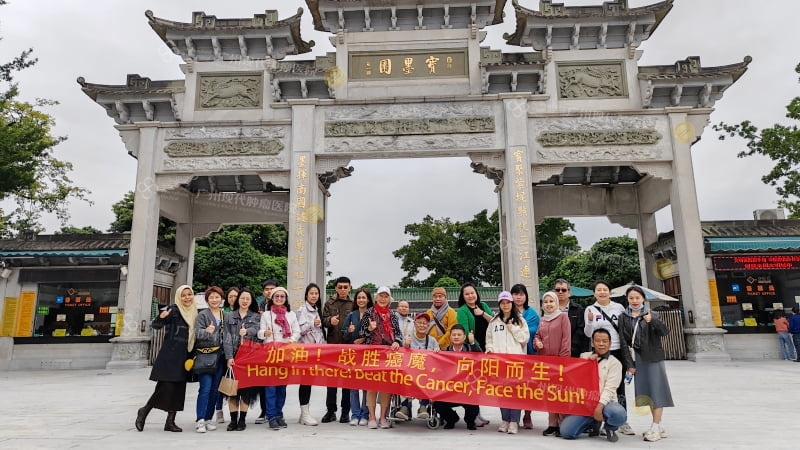
After the event, Ruan Thanh Tung, together with other anti-cancer stars, experienced a wonderful trip to Guangzhou. He walked along the banks of the Pearl River and wandered through the Lingnan architecture of the Bao Mo Yuan, where the autumn sun was blazing and the cool autumn breeze blew in his face from time to time, which made him feel the beauty of life and the poetry of living, "If there is nothing to worry about, it is a good time in the world".
He believes that he was lucky that he was caught fairly early and treated in time, while other cancer patients also deserve such happy moments, the key is inner bravery and perseverance. He says to cancer patients, "If you have a tumor, please don't be afraid because it is just a chronic disease with a much longer treatment process. We walk together and believe that we can beat cancer!"
Introduction to Interventional Therapy
Interventional therapy, puncture under the guidance of medical imaging equipment, the use of special guide wires and other precision instruments, the concentration of anti-tumor drugs than intravenous drip drugs 2 to 8 times higher than directly injected into the internal tumor, at the same time, the blood supply artery of the tumor to embolize the tumor, to achieve the purpose of tumor shrinkage or even disappearance.
1、It has the advantages of small trauma, less complication, safety, and fast recovery.
2、It is suitable for patients who have poor effect of using traditional radiotherapy, unwilling or unsuitable for surgery.
*Surgery, in addition to the appropriate chemotherapy and radiotherapy, are effective in treating early cancer, but certain patients in late stage of cancer may not be tolerate surgery well as they can be relatively weak. A combination of carefully planned minimally invasive therapy, chemotherapy or radiotherapy can effectively reduce the side effects and discomfort of treatment and may help patient get better efficacy.













 viber
viber